Coping with grief after a dementia diagnosis involves understanding that loss isn’t just physical but emotional and ongoing. Acknowledge your feelings, allowing yourself to express emotions like sadness or frustration through journaling, talking, or creative outlets. Build a support system by connecting with loved ones and support groups, and educate yourself about dementia’s progression to foster acceptance. Practicing mindfulness, self-care, and long-term planning can help you adapt. Continue exploring these strategies to find greater resilience and understanding.
Key Takeaways
- Acknowledge and accept the ongoing nature of grief as dementia progresses, allowing space for emotional waves.
- Seek support from loved ones and support groups to share feelings and reduce feelings of isolation.
- Educate yourself about dementia stages to set realistic expectations and foster emotional resilience.
- Engage in rituals and memory-preserving activities that honor your loved one and facilitate healing.
- Practice self-care techniques like mindfulness, journaling, and breathing exercises to manage emotional stress.
Understanding the Nature of Grief in Dementia
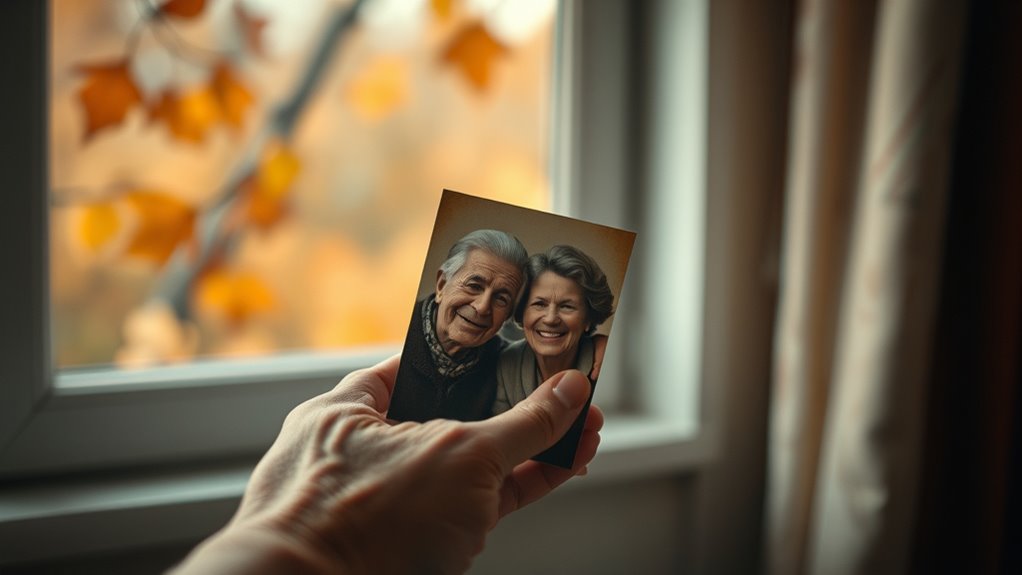
Have you ever wondered why grief in dementia feels so complex? It’s because you’re grieving not just the person’s decline but also the loss of your shared identity and future. This type of grief challenges your emotional resilience, pushing you to adapt to constant changes. Grief processing isn’t linear; you may feel waves of sadness, frustration, or guilt unexpectedly. Recognizing that these feelings are normal helps you accept your emotional experience. Understanding the nature of grief in dementia means acknowledging that it involves ongoing loss, not just the initial diagnosis. Incorporating well-being tips such as mindfulness or relaxation techniques can help manage emotional stress. By strengthening your emotional resilience, you can better navigate these difficult emotions. Remember, grief is a journey, and being patient with yourself is essential in managing its complexities.
Recognizing the Emotional Stages You May Experience
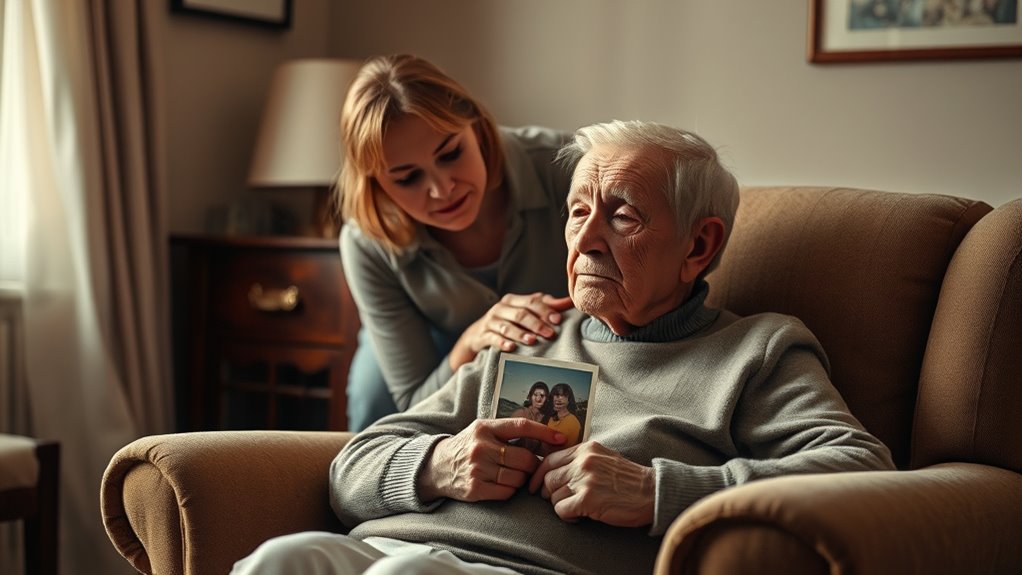
As you process your loved one’s diagnosis, you might first feel shock or deny what’s happening. Over time, you could find yourself moving toward acceptance and even personal growth. Recognizing these emotional stages helps you understand what you’re experiencing and guides you through your grief.
Shock and Denial
When you first learn about a dementia diagnosis, you might feel overwhelmed by shock and disbelief. It’s common to experience emotional numbness, where your feelings seem distant or muted. You may find yourself questioning the diagnosis or refusing to accept it, part of the denial process. This disbelief helps protect you from the full impact of the news, allowing you to temporarily avoid facing painful realities. During this stage, it’s normal to oscillate between moments of hope and despair. You might tell yourself this isn’t true or wait for things to return to how they were. Recognizing that these feelings are natural helps you understand that shock and denial are part of your emotional response. Incorporating emotional processing techniques can aid in navigating these initial reactions. Give yourself permission to feel these things without judgment.
Acceptance and Growth
Moving from the initial shock and denial, acceptance begins to take shape as you start to acknowledge the reality of the diagnosis. This shift fosters personal growth and strengthens emotional resilience. You may find yourself oscillating between hope and sadness, but gradually, you accept the situation. Recognizing these emotional stages helps you process grief more effectively. Use this table as a guide:
| Emotions | Actions |
|---|---|
| Denial | Seek support, gather information |
| Frustration | Practice patience, self-compassion |
| Acceptance | Focus on quality of life, connection |
| Growth | Embrace new routines, find purpose |
Understanding these phases allows you to navigate grief with greater clarity, fostering resilience and opening doors to personal growth. This awareness can also help you identify when you might need additional support during difficult times.
Allowing Yourself to Feel and Express Your Emotions

Allowing yourself to feel and express your emotions is a vital step in coping with grief after a dementia diagnosis. Suppressing feelings can lead to emotional buildup and hinder healing. Embrace emotional release by seeking expressive outlets that work for you. Here are some ways to do that:
Allow yourself to feel and express emotions to heal and build resilience after a dementia diagnosis.
- Write in a journal to process your thoughts and feelings.
- Talk openly with trusted friends or family members.
- Engage in creative activities like art or music to express emotions non-verbally.
- Allow yourself to cry or feel anger without judgment.
- Practicing meditation can help you cultivate awareness of your emotions and promote emotional balance during difficult times.
These outlets help you acknowledge your pain and foster emotional resilience. Remember, expressing your emotions isn’t a sign of weakness; it’s essential for healing and maintaining your mental health during this challenging time.
Building a Support System of Family and Friends
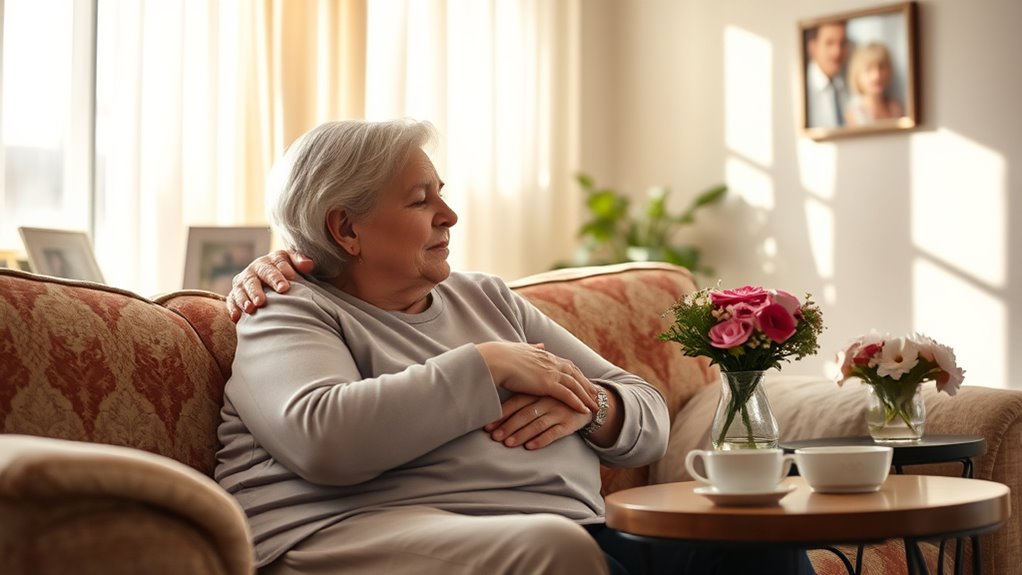
Sharing your feelings and expressing emotions is a vital part of coping with grief after a dementia diagnosis. Building a support system of family and friends provides the caregiver support you need to strengthen your emotional resilience. Reach out to trusted loved ones who can listen without judgment and offer comfort. Don’t be afraid to ask for help with daily tasks or just to share your concerns. Connecting with others who understand your situation can lessen feelings of isolation and help you process your grief. Remember, you don’t have to face this alone—lean on your network for strength, encouragement, and understanding. A strong support system not only eases your emotional burden but also helps you stay resilient through difficult times. Incorporating emotional support techniques can further enhance your ability to cope and foster feelings of hope and connection.
Seeking Professional Help and Counseling
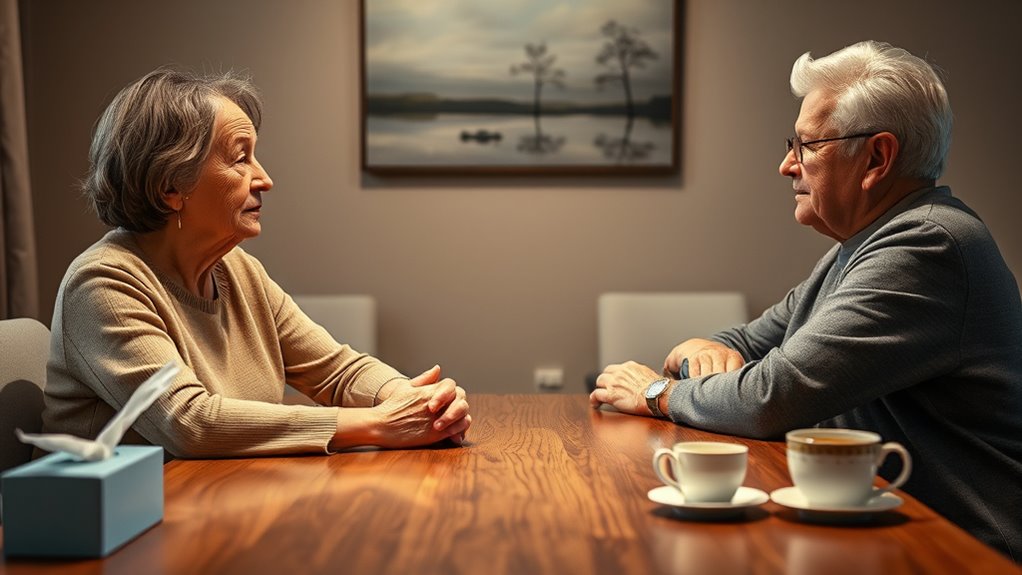
Seeking professional help can provide essential support as you cope with your grief. Finding qualified therapists and joining support groups can make you feel less alone and more understood. Overcoming stigma together helps you embrace these resources and take meaningful steps toward healing. Recognizing the importance of mental health awareness can encourage you to seek out additional assistance and community support.
Finding Qualified Therapists
When searching for a qualified therapist to help you cope with grief after a dementia diagnosis, it’s essential to look for professionals who specialize in grief counseling and have experience working with dementia-related issues. Consider how therapeutic approaches align with your needs, whether it’s cognitive-behavioral therapy, grief-focused therapy, or other methods. Ensuring therapy accessibility is also important, so verify if sessions are available in person, online, or via phone. To find the right fit, ask about their familiarity with dementia-related grief, credentials, and approach. Here are some tips:
- Confirm their experience with dementia and grief counseling
- Explore different therapeutic approaches to find what suits you
- Check therapy accessibility options, including online availability
- Seek recommendations from healthcare providers or trusted sources
- Pay attention to the signs of spoiled lemon juice or other indicators that the professional’s expertise is current and reliable.
Benefits of Support Groups
Support groups offer a valuable way to connect with others facing similar challenges after a dementia diagnosis. Sharing your feelings in a supportive environment can ease feelings of isolation and validate your experiences. Many groups provide access to grief counseling, helping you process your emotions and navigate complex grief. Participating regularly can also strengthen your emotional resilience, giving you tools to cope with ongoing changes. Hearing others’ stories and strategies offers new perspectives and hope. Support groups foster a sense of community, reminding you you’re not alone in this journey. The emotional support gained can be a crucial part of your healing process, helping you manage grief more effectively while maintaining your well-being. Understanding decoding slang involved in shared stories may also help you connect more deeply with others’ experiences.
Overcoming Stigma Together
Overcoming stigma around dementia often requires collective effort and open conversations, especially when it comes to seeking professional help. To foster stigma reduction and cultural acceptance, consider these steps:
- Educate yourself and others about dementia to dispel myths and misconceptions.
- Share your experiences openly to normalize seeking help for mental health and dementia-related concerns.
- Encourage community dialogues that promote understanding and acceptance of dementia.
- Advocate for policies that support mental health services, emphasizing their importance in cultural acceptance.
- Recognize the importance of understanding narcissistic behaviors in family and community dynamics to foster empathy and reduce judgment around mental health issues.
Creating Rituals and Memories to Honor Your Loved One

Creating rituals and memories to honor your loved one can provide a meaningful way to keep their spirit alive and foster healing. Memorial rituals, such as lighting a candle or planting a tree, create tangible ways to commemorate their life. These acts help you preserve their memory and feel connected even after they’ve passed. You might also consider creating a scrapbook or recording stories to aid in memory preservation. Engaging in these rituals allows you to celebrate your loved one’s unique personality and legacy. They serve as a reminder that, although their physical presence is gone, their impact continues. Incorporating quinoa preparation into family meals can also be a nourishing way to remember shared times and create new traditions. By intentionally honoring them, you can find comfort and strength as you navigate your grief journey.
Practicing Self-Care and Mindfulness Techniques

Practicing self-care and mindfulness can help you manage your grief more effectively. Simple techniques like breathing exercises, journaling, and establishing mindful daily routines can bring moments of calm and clarity. Incorporate these practices into your day to nurture your well-being during this challenging time.
Breathing Exercises for Calm
When dealing with the emotional toll of a dementia diagnosis, taking a few moments to focus on your breath can make a significant difference. Deep breathing and calming breaths help reduce stress and bring a sense of peace. To get started:
- Find a comfortable seated position and close your eyes.
- Inhale slowly through your nose, filling your lungs completely.
- Hold your breath for a moment, then exhale gently through your mouth.
- Repeat this process, focusing on each breath to promote relaxation.
Practicing these breathing exercises regularly can help you manage anxiety and maintain emotional balance. Remember, simple deep breathing techniques are a powerful tool to create calm amid challenging moments.
Journaling for Reflection
Journaling offers a meaningful way to process your emotions and practice mindfulness during difficult times. Creative journaling allows you to explore your feelings through writing, drawing, or collage, providing a safe outlet for emotional expression. By putting your thoughts on paper, you gain clarity and release pent-up grief or frustration. This reflective practice helps you stay connected with your feelings while fostering self-awareness. As you journal regularly, you create a personal space to reflect on your experiences and observe your emotional journey. Incorporating creative elements can make this process more engaging and healing. Over time, journaling becomes a gentle form of self-care, helping you navigate grief with mindfulness and compassion.
Mindful Daily Routines
In the midst of grief, establishing mindful daily routines can provide stability and comfort. Incorporating daily mindfulness helps ground you and creates a sense of normalcy. Here are four ways to develop mindful routines:
- Start your day with deep breathing or meditation to set a calm tone.
- Schedule regular breaks to pause and observe your surroundings, practicing daily mindfulness.
- Engage in gentle movement, like stretching or walking, to connect with your body.
- End your day with gratitude journaling or reflection, fostering a peaceful mindset.
Educating Yourself About Dementia and Its Progression

Understanding the different stages of dementia is essential for managing your expectations and making informed decisions. As you learn about how memory loss progresses, you’ll better anticipate changes and adapt your caregiving approach. Knowing what to expect can reduce caregiver stress, helping you stay patient and compassionate. Early stages may involve forgetfulness and confusion, while later stages can bring severe memory impairment and difficulty communicating. Educating yourself about these stages helps you recognize signs of decline and seek appropriate support. It also empowers you to plan for future needs, ensuring your loved one receives the best care possible. Gaining knowledge about dementia’s progression helps you navigate the emotional journey with clarity, resilience, and a proactive mindset.
Finding Comfort in Support Groups and Community Resources
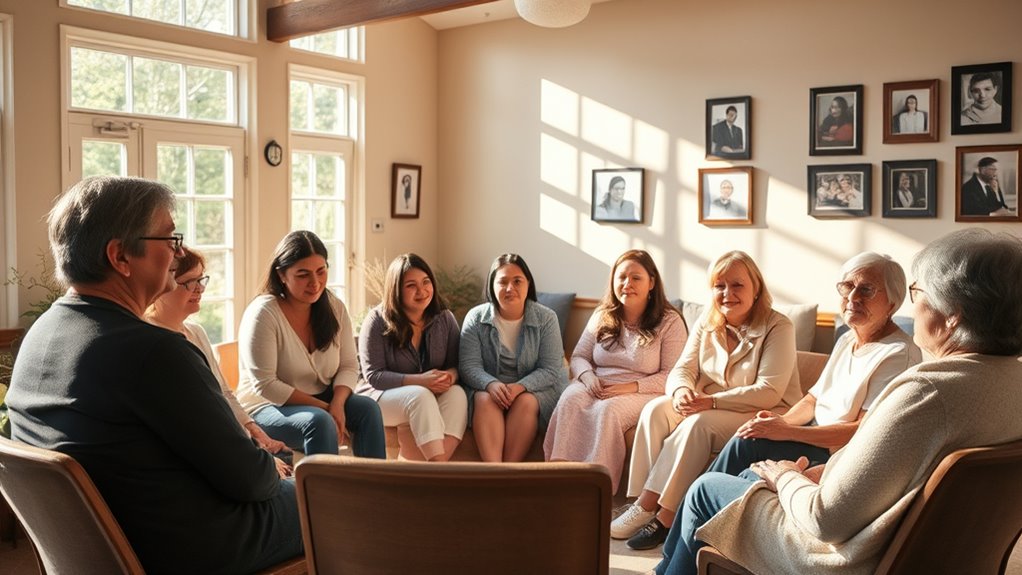
Finding comfort in support groups and community resources can provide essential emotional relief and practical guidance during the challenging journey of caregiving. Connecting with others who understand your experience boosts emotional resilience and offers fresh perspectives. Peer connections help you realize you’re not alone, easing feelings of isolation. Consider these options:
- Join local or online support groups to share experiences and gain encouragement.
- Access community centers offering caregiver workshops and resources.
- Reach out to mental health professionals experienced in dementia care.
- Utilize national helplines and online forums for immediate advice and peer support.
These resources foster emotional strength and provide a safe space to express grief, helping you navigate caregiving with resilience. Building these connections can make a significant difference in your well-being.
Developing a Long-Term Perspective and Forward-Looking Strategies
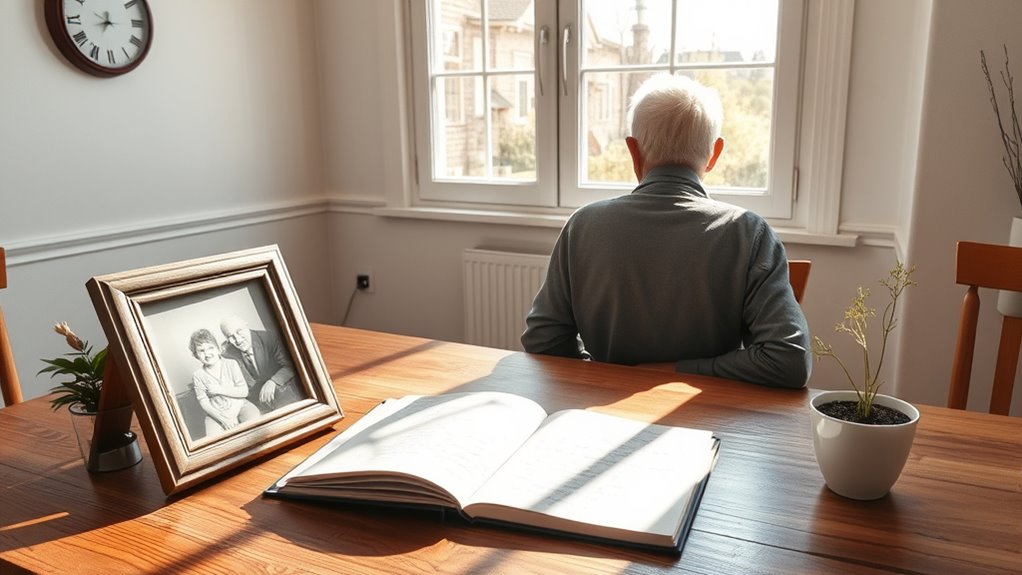
As you navigate the emotional and practical challenges of a dementia diagnosis, developing a long-term perspective becomes essential for planning and resilience. By focusing on future planning, you can set realistic goals and prepare for changing needs, reducing uncertainty and stress. Embrace forward-looking strategies that prioritize your loved one’s comfort and quality of life. Building emotional resilience helps you adapt to ongoing changes and setbacks, strengthening your capacity to cope. Consider creating flexible plans that can evolve over time, allowing you to respond proactively rather than reactively. Remember, maintaining hope and a sense of purpose will support your well-being. Developing this long-term outlook empowers you to face the future with confidence, ensuring you’re better equipped to handle the journey ahead.
Frequently Asked Questions
How Can I Maintain Hope While Grieving the Loss of the Person I Knew?
You might wonder how to maintain hope while grieving the loss of the person you knew. Focus on hope preservation by celebrating small moments and recognizing ongoing connections. Practice emotional resilience by accepting your feelings and seeking support when needed. Remember, hope can evolve and adapt through your journey, helping you find meaning and strength even in difficult times. Keep nurturing hope, and it can guide you toward healing and peace.
What Are Common Misconceptions About Grief After a Dementia Diagnosis?
Many believe grief follows a linear stages of grief model, but it’s often more complex. You might think cultural beliefs dictate how you grieve, but everyone processes loss differently, regardless of background. Some assume you should feel immediate sadness or move on quickly, but grief varies widely. Recognizing these misconceptions helps you understand that your emotional journey is unique, and there’s no “right” way to grieve after a dementia diagnosis.
How Does Grief Impact Physical Health and Well-Being?
Grief can hit you like a ton of bricks, impacting your physical health and emotional resilience. You might notice fatigue, sleep issues, or weakened immunity, making it harder to stay strong. Emotional strain can lead to stress or anxiety, further taking a toll on your well-being. Recognizing these signs helps you address your needs and build resilience, so you can better navigate this challenging time and protect your health.
Can Grief Symptoms Re-Emerge After Initial Resolution?
You might experience recurrent grief or emotional regression even after initially feeling better. Grief isn’t always linear; it can resurface unexpectedly due to memories, anniversaries, or stress. These symptoms can re-emerge, making you feel like you’re back at square one. Recognizing this helps you understand that healing takes time, and it’s okay to seek support again. Be gentle with yourself, knowing that emotional cycles are natural.
How Do I Navigate Conflicting Emotions of Love and Frustration?
Imagine your emotions as a delicate tightrope, balancing love and frustration with each step. You might sway between warmth and irritation, feeling pulled in different directions. To navigate this, focus on emotional balancing by acknowledging each feeling without judgment, and communicate openly with family members to understand their perspectives. This creates a supportive web, helping you maintain stability amidst family dynamics, and find peace amid conflicting emotions.
Conclusion
Remember, traversing grief after a dementia diagnosis is a journey, much like Odysseus’s voyage—full of unexpected turns and lessons. Embrace your feelings, lean on your support system, and seek knowledge and help when needed. With patience and resilience, you’ll find moments of peace amid the storm. Just as the phoenix rises from ashes, you can discover hope and strength in this challenging chapter, forging a new path forward with courage and compassion.









